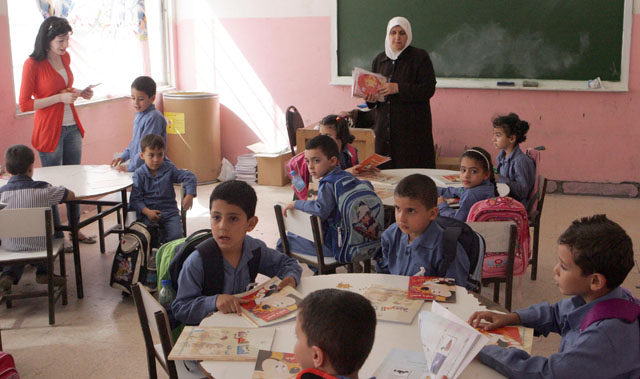AMMAN — After the vast majority of early grade students were found to lack fundamental reading and mathematics skills in 2012, a one-year experimental programme has managed to change the status quo in the schools it was applied in.
The National Early Grade Literacy and Numeracy Intervention Pilot Project, launched by the Education Ministry with the support of USAID, was implemented in response to a study conducted in 2012 which showed that only one in five second and third graders were reading with comprehension and that children were unable to perform basic mathematical functions with real understanding, depending instead on memorisation.
In only one year, the intervention project managed to double the number of children reading with comprehension and performing mathematics with understanding, according to the results of an assessment survey conducted to measure the outcomes of the programme.
The project significantly reduced the proportion of the lowest performers and increased the proportion of the highest performers among students in the targeted schools, USAID said at a ceremony to announce the results of the intervention on Thursday.
The number of students reading with comprehension increased from 12 per cent in 2012 to 24 per cent, while the number of students doing mathematics with understanding increased from 14 per cent to 24 per cent, the study showed.
The plan involved 350 teachers working with 12,000 students in grades one through three at 43 schools affiliated with 12 education departments across Jordan.
The teachers were introduced to a daily 15-minute focused training session before the start of each lesson to reinforce foundational reading and mathematics skills using materials developed by the Education Ministry.
The study advised the ministry to examine the possibility of recruiting only women teachers in the early grades as students who were taught by female educators had performed better than their peers taught by male teachers.
The recommendations also included calls to have only all-girl or coeducation classes in the early grades, as students in these educational environments tended to perform better.
The study highlighted the need to increase supervisors’ visits to schools, monitor the implementation of new curricula and provide more training to teachers and supervisors.
The ministry was also advised to incorporate the methodologies of the intervention in the training of teachers.
During Thursday’s workshop, Education Minister Mohammad Thneibat expressed his “disappointment” over the results of the 2012 study, pledging to “feminise education” in primary grades and ban substitute educators from teaching these classes, as the study showed that substitutes were associated with an 11 per cent decrease in the number of readers or mathematical literates.
Stressing the significance of the intervention project and the progress it realised in only one year, he underlined that the Education Ministry is “not responsible for resolving unemployment in Jordan” and that it will start appointing teachers based on their scores in evaluation exams designed to gauge their competence as educators.
USAID Mission Director Beth Paige noted that the pilot project was “encouraging at several levels”, showing that children are able to read with comprehension and perform mathematics with understanding as long as “we provide them with appropriate support” and that the ministry has the willingness and capacity to respond to such a situation.
